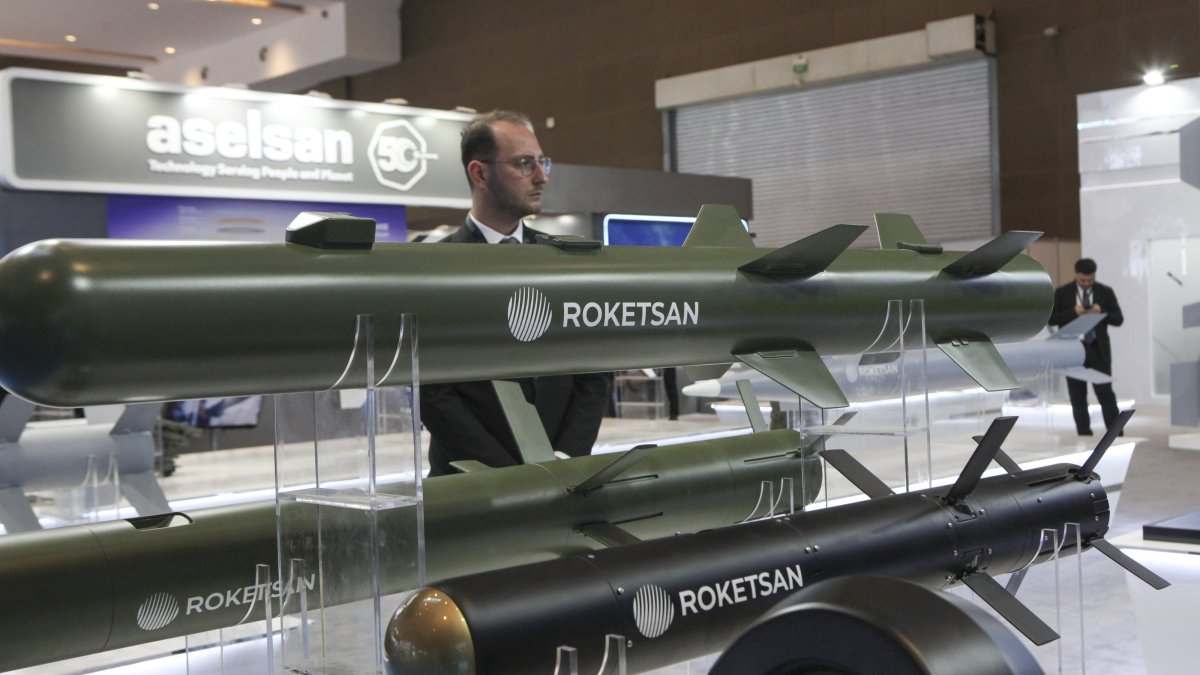President Recep Tayyip Erdoğan has said this week he plans to strengthen the country’s deterrence capabilities, including the production of missiles amid growing tensions in the region.
Erdoğan announced plans this week to step up Türkiye’s production of medium- and long-range missiles, as the attacks between Israel and Iran escalate.
The president discussed the Israel-Iran war with German Chancellor Friedrich Merz in a telephone call on Friday. He told Merz that the Iranian nuclear issue can only be resolved through negotiations and warned that Israel’s attack has severely heightened threats to regional security, according to the Directorate of Communications.
“Our President also warned that the spiral of violence triggered by Israel’s attacks could negatively impact both the region and Europe, particularly in terms of potential migration waves and nuclear fallout,” the directorate said on X.
Erdoğan engaged in flurry of talks with other leaders, including U.S. President Donald Trump twice since the start of Israel’s attacks on Iran. Following the U.S. strikes on nuclear facilities in Iran, the Foreign Ministry expressed deep concern on Sunday over the strikes, warning it could escalate the regional conflict into a global one.
“As Türkiye, we have consistently warned about the risk of the conflict, sparked by Israeli aggression, spreading throughout the region and destabilizing the security environment.”
“The U.S. attack carried out today (June 22) on Iran’s nuclear facilities has elevated that risk to its highest level,” the ministry said in a statement.
Despite Türkiye’s tense relations with Israel, analysts and officials don’t see an immediate threat of the conflict spreading into NATO-member Türkiye.
Still, some see the move by Erdoğan as a sign that the Israel-Iran war could trigger a new arms race in the region, with countries not directly involved in the fray ramping up their military efforts to preempt future conflicts.
In the last two decades, Türkiye has boosted its domestic capabilities, working on a wide range of projects and successfully building and exporting products ranging from drones to armed vehicles.
Lately, the renewed attention has been placed also on the Steel Dome project which is envisaged to provide phased and integrated protection against low, medium and high-altitude threats through systems developed by Turkish defense firms.
Companies such as Aselsan and Roketsan play a key role in this sense, with systems such as Hisar-A and Hisar-0, which provide effective protection against aircraft, cruise missiles, unmanned aerial vehicles (UAVs) and helicopters.
The Israeli army on Friday declined to comment on Türkiye’s plans to ramp up missile production, but Israeli Foreign Minister Gideon Saar responded to Erdoğan’s criticisms of Israel over its attack on Iran in an X post earlier during the week.
Ahmet Kasım Han, a professor of international relations at Istanbul’s Beykoz University, said that Türkiye was reacting to what he described as an unraveling world order.
“The Turkish government is drifting toward what is the name of the game in the Middle East right now: an escalation of an arms race,” he said, adding that Israel and the U.S. have set a high standard in aerial warfare, creating a technological gap that Türkiye and others are eager to close.
Erdoğan said following a Cabinet meeting on Monday that, “We are making production plans to bring our medium- and long-range missile stockpiles to a level that ensures deterrence, in light of recent developments.”
“God willing, in the not-too-distant future, we will reach a defense capacity that is so strong that no one will even dare to act tough toward us,” Erdoğan said.
In an separate address days later, he highlighted Türkiye’s progress in its domestically developed defense industry, that includes drones, fighter jets, armored vehicles and navy vessels, but stressed that continued effort was needed to ensure full deterrence.
The ongoing conflict has reinforced the importance of air superiority, including missiles and missile defense systems, prompting “countries in the region, including Türkiye, to strengthen its air power,” said Özgür Ünlühisarcklı, a Türkiye analyst at the German Marshall Fund think tank.
Since the start of the conflict, Erdoğan has been scrambling to end the hostilities. He has held a flurry of phone calls with leaders, including Trump and Iranian President Masoud Pezeshkian, offering to act as a “facilitator” for the resumption of negotiations on Iran’s nuclear program.
There are concerns in Türkiye that a prolonged conflict could cause energy disruptions and lead to refugee movement from Iran, with which it shares a 560 kilometer-long (348-mile) border.
Türkiye relies on energy imports, including from Iran, and rising oil prices due to the conflict could aggravate inflation, just at the time when it entered a continued downward trend. It has strongly criticized Israel’s actions, saying Iran has the legitimate right to defend itself against Israel’s attacks, which came as nuclear negotiations were ongoing.
The ties between Türkiye and Israel have grown deeply estranged, especially after the start of the devastating war in Gaza in 2023, with Erdoğan becoming one of Israeli Prime Minister Benjamin Netanyahu’s fiercest critics.
Relations further deteriorated following the fall of former Syrian leader Bashar Assad’s government.
Earlier this year, Türkiye and Israel established a “de-escalation mechanism” aimed at preventing conflict between their troops in Syria. The move came after Syria’s Foreign Ministry said that Israeli jets had struck a Syrian air base that Türkiye reportedly hoped to use.
Erdoğan’s ally, Devlet Bahçeli, the head of Nationalist Movement Party (MHP), also suggested that Türkiye was a potential target for Israel, accusing the country of strategically “encircling” Türkiye with its military actions.

